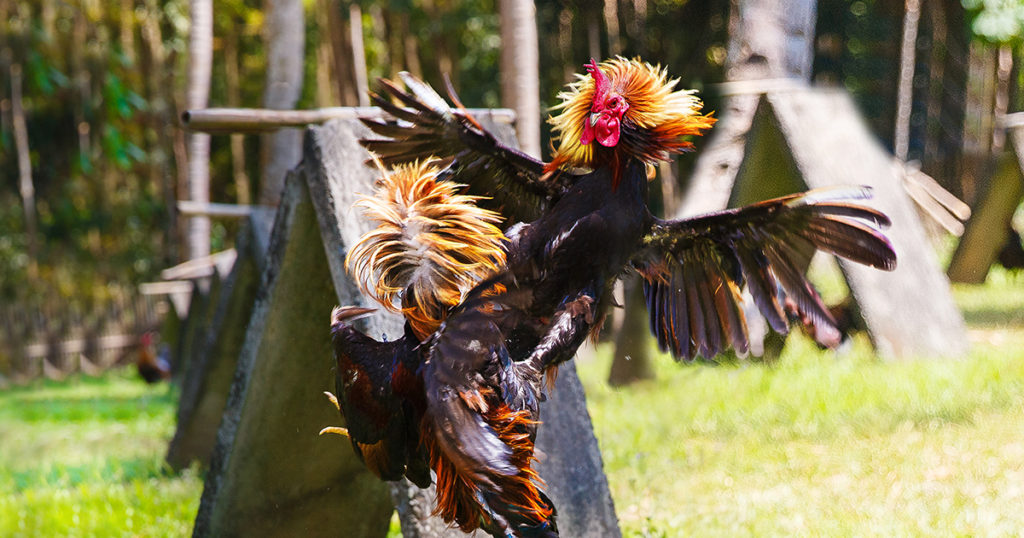There’s been progress against animal cruelty in Guam and Puerto Rico, but there are still troubling actions by some political leaders in both U.S. territories. It’s past due for them, including Puerto Rico’s newly elected governor, to show leadership and make it plain that illegal animal fighting must stop on the islands.
Earlier this month, the U.S. Court of Appeals for the First Circuit affirmed the constitutionality of the federal law against animal fighting as applied to Puerto Rico, removing any thread of an argument that cockfighters in the Commonwealth legally stage animal fights there.
“We affirm the district court’s decision and hold that Section 12615 is a valid exercise of Congress’s Commerce Clause power and does not violate plaintiffs’ individual rights,” wrote the three-judge panel in a ruling handed down on January 14th. The decision came after cockfighting interests appealed an October 2021 ruling by U.S. District Court Judge Gustavo Gelpi who granted the motion for summary judgment from the United States. A native of Puerto Rico, Gelpi declared that “[n]either the Commonwealth’s political statues, nor the Territorial Clause, impede the United States Government from enacting laws that apply to all citizens of this Nation alike, whether as a state or territory.”
Meanwhile, on Guam, Governor Lou Leon Guerrero last week signed the Protecting Animal Welfare and Safety (PAWS) Act, also known as Pugua’s Law to honor the memory of the dog whose violent killing spurred a movement to change Guam’s animal cruelty laws. The PAWS Act, led by Senator Sabina Perez and lobbied for by Guam Animals In Need (GAIN), dramatically upgrades the territorial law against animal cruelty. That measure upgrades penalties for malicious cruelty and neglect, strengthens the dogfighting law, and bans the practice of bestiality. Thanks to GAIN and some humane-minded lawmakers, Guam now has one of the strongest anti-cruelty laws in the nation.
The new law does, however, have one major defect: it does not ban cockfighting. More to the point, the PAWS Act has an amendment, attached by Senator Jose Terlaje, “to officially recognize cockfighting as a cultural practice under Guam law.”
Normally, a pro-cockfighting provision like this one in a larger anti-cruelty bill would be a poison pill provision for us at Animal Wellness Action and a reason for us to oppose the legislation. The difference here is that Terlaje’s provision is without any legal authority. It is window dressing. Federal law, affirmed by a U.S. District Court in Guam, already bans cockfighting in the territory. Long before this legislative maneuver, Guam had chosen not to ban cockfighting, and that’s precisely why AWA worked so hard to support national legislation to ban the activity in the U.S. and its territories, including on Guam.
Legislative actions to disavow the federal law have been a common course of action for some lawmakers on Guam and Puerto Rico. At the end of 2019, just before the federal anti-cockfighting law was to take national effect, Puerto Rico’s legislature passed a cosmetic provision similar to the amendment to PAWS. Like the Guam measure, the amendment to Puerto Rico’s law is legally meaningless. But it’s a dog whistle to the cockfighters in these territories, who may try to use this language as a pretense for illegal conduct. An investigation we conducted some months ago in Puerto Rico revealed cockfighters continuing to stage fights at more than 25 pits and arenas.
This week, I wrote to Puerto Rico Governor Pedro Pierluisi — with former Oklahoma Attorney General Drew Edmondson and animal law expert Ana Maria Hernandez Marti in San Juan as my co-authors — and urged him to speak up on this matter and intercede to stop confusing and legally unsupported messages to the Commonwealth’s cockfighters:
“Earlier this month, you took the oath of office, swearing to defend the U.S. Constitution and that of the Commonwealth, more than a year after a U.S. District Court in San Juan affirmed the constitutionality of a federal law banning cockfighting and more than a week before the U.S. Court of Appeals affirmed it. With these unambiguous rulings — where cockfighting interests pleaded their case and acknowledged the authority of the U.S. courts to adjudicate this matter — there can be no doubt that the United States has the authority under the Commerce Clause to halt this form of animal cruelty, which is intertwined with gambling, electronic promotions, and other instrumentalities of interstate commerce. Whatever your views about cockfighting — whether approval or antipathy — we urge you to act in a way that promotes adherence to the law.”
We just went through a national crisis where the former President fabricated an argument about a stolen election, even after the courts decided the issue. We don’t need politicians in Puerto Rico or Guam making up a lie about the legality of cockfighting in the wake of court rulings that say exactly the opposite. In our letter to Governor Peirluisi that “[p]oliticians and citizens can criticize federal policy actions, but they cannot opt out of federal laws on their whim.”
Politicians are unwittingly putting cockfighters in legal jeopardy with this kind of pandering. They owe it to their constituents to tell the truth: that violating the federal law against cockfighting brings serious penalties — a fine of up to $250,000 and prison time of up to 5 years for each violation. It’s time for territorial politicians to send a clear message to cockfighters “to stop gathering at fighting venues, to lay down the knives and gaffs they affix to the birds’ legs, and to cease any staging of animal fights.”
